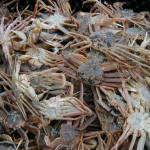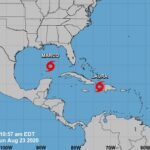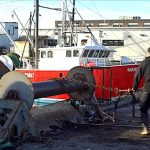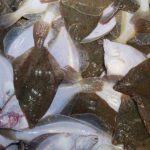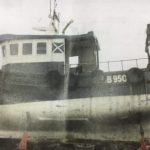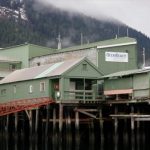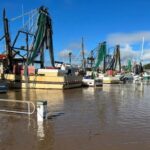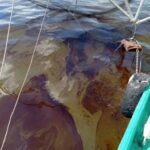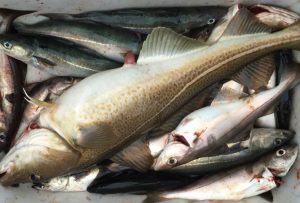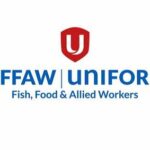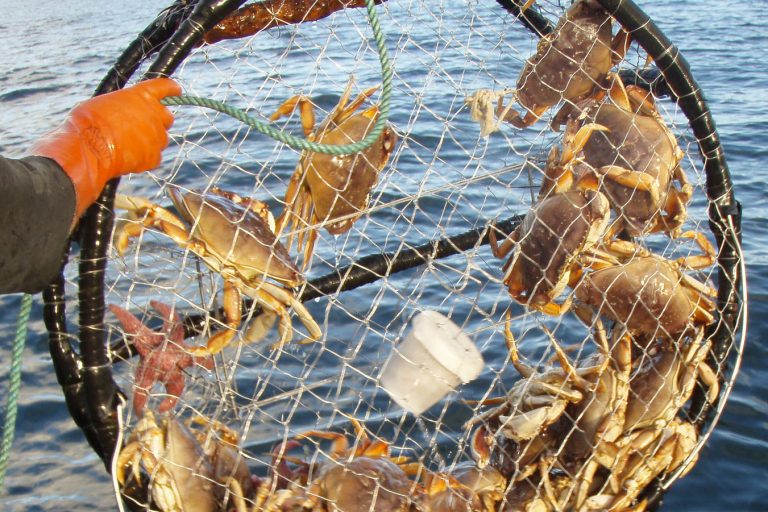Tag Archives: Alaska Seafood Industry
How a Risky State Investment in Seafood Cost Alaskans Millions and left a Fishing Town in Crisis
 Last summer, an unsettling quiet cloaked the isolated Southwest Alaska community of King Cove as the town’s economic engine — a sprawling seafood processing plant — sat shuttered. Bunkhouses, once filled with hundreds of workers during the peak salmon harvest, were vacant. Four diesel generators that had rumbled day and night were stilled. The plant docks, once lined with boats and circled by fish-scavenging gulls, were empty. The closure resulted from the financial implosion of the plant’s owner, Peter Pan Seafood. Some local fishing boat captains directed their ire at company leaders who accepted their seafood, then failed to pay them. They dwelled far less on a surprising, largely silent, powerhouse investor in the plant: the state of Alaska. Photos, more, >>CLICK TO READ<< 12:41
Last summer, an unsettling quiet cloaked the isolated Southwest Alaska community of King Cove as the town’s economic engine — a sprawling seafood processing plant — sat shuttered. Bunkhouses, once filled with hundreds of workers during the peak salmon harvest, were vacant. Four diesel generators that had rumbled day and night were stilled. The plant docks, once lined with boats and circled by fish-scavenging gulls, were empty. The closure resulted from the financial implosion of the plant’s owner, Peter Pan Seafood. Some local fishing boat captains directed their ire at company leaders who accepted their seafood, then failed to pay them. They dwelled far less on a surprising, largely silent, powerhouse investor in the plant: the state of Alaska. Photos, more, >>CLICK TO READ<< 12:41
A Rebuttal to a Recent Commentary: Alaska trawl fisheries are vital and under attack by those using myths
 This campaign to ban trawling – a sustainable fishing method responsible for a substantial majority of fishery landings in the Alaska Region and nationally – poses a direct threat to Alaska’s coastal economy, seafood sector and way of life. If you enjoy wild seafood – fish sandwiches or shrimp; fish sticks or scallops; fish tacos or rockfish – you are enjoying seafood caught by “trawl” or “dredge” fishing gears that touch the seafloor. It’s true that these fishing methods, like every farm, aquaculture facility and fishing operation on the planet, impact the environment. But, what’s also true is that the impacts of trawl fishing in Alaska are continually monitored to ensure long-term ecosystem health. The recent commentary authored for the Alaska Beacon by Heather Sauyaq Jean Gordon and David Bayes is the latest effort to demonize sustainable trawl fisheries. Like other attacks on our sector, the commentary comes from a vocal few that play fast and loose with the facts. By Sam Wright, more, >>CLICK TO READ<< 11:43
This campaign to ban trawling – a sustainable fishing method responsible for a substantial majority of fishery landings in the Alaska Region and nationally – poses a direct threat to Alaska’s coastal economy, seafood sector and way of life. If you enjoy wild seafood – fish sandwiches or shrimp; fish sticks or scallops; fish tacos or rockfish – you are enjoying seafood caught by “trawl” or “dredge” fishing gears that touch the seafloor. It’s true that these fishing methods, like every farm, aquaculture facility and fishing operation on the planet, impact the environment. But, what’s also true is that the impacts of trawl fishing in Alaska are continually monitored to ensure long-term ecosystem health. The recent commentary authored for the Alaska Beacon by Heather Sauyaq Jean Gordon and David Bayes is the latest effort to demonize sustainable trawl fisheries. Like other attacks on our sector, the commentary comes from a vocal few that play fast and loose with the facts. By Sam Wright, more, >>CLICK TO READ<< 11:43
Dire condition of Alaska’s seafood industry has many causes and no easy fixes, experts say
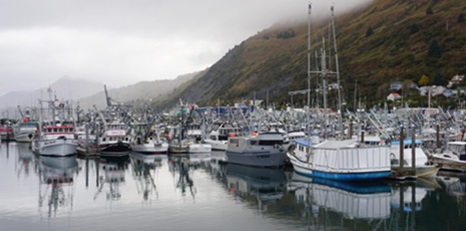 State officials and industry leaders trying to rescue the ailing Alaska seafood industry are facing daunting challenges, recently released numbers show. The industry lost $1.8 billion last year, the result of low prices, closed harvests and other problems, according to the National Oceanic and Atmospheric Administration. State Rep. Bryce Edgmon, I-Dillingham, part of a task force charged with making recommendations on ways that lawmakers can help rescue the industry, said the solutions will be difficult and will require the full attention of his colleagues next year. Joe Bundrant, chief executive officer of Trident Seafoods, described how Russian fish production is part of a “perfect storm” of low prices, devaluation of Alaska’s product and a geopolitical landscape “like I’ve never seen anything close to it.” more, >>CLICK TO READ<< 14:36
State officials and industry leaders trying to rescue the ailing Alaska seafood industry are facing daunting challenges, recently released numbers show. The industry lost $1.8 billion last year, the result of low prices, closed harvests and other problems, according to the National Oceanic and Atmospheric Administration. State Rep. Bryce Edgmon, I-Dillingham, part of a task force charged with making recommendations on ways that lawmakers can help rescue the industry, said the solutions will be difficult and will require the full attention of his colleagues next year. Joe Bundrant, chief executive officer of Trident Seafoods, described how Russian fish production is part of a “perfect storm” of low prices, devaluation of Alaska’s product and a geopolitical landscape “like I’ve never seen anything close to it.” more, >>CLICK TO READ<< 14:36
Fear, legacy and the Alaska seafood industry
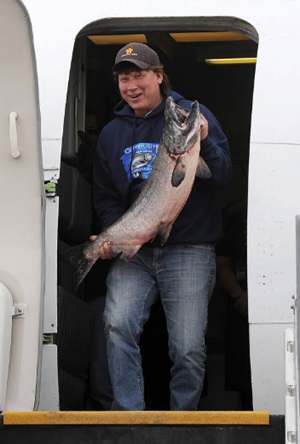 My journey began from a deep-rooted fear — the fear of watching a livelihood, passed through generations of commercial fishermen, slip through my fingers. Three decades ago, I was a young Copper River fisherman caught in the middle of a market crash. Farmed salmon had just entered the U.S., tanking prices for wild Alaska salmon. As a young commercial fisherman, fiercely proud of the salmon I caught, this shift turned my world upside down. At that moment, I made a pivotal decision — band with three other fishermen, three other fishermen, and wage a battle for the premium markets I felt Alaska salmon rightfully deserved. Spoiler alert: It’s been three decades, and we’re still fighting every day to compete. With experience, I’ve learned that my competition extends beyond other seafood; it’s beef, poultry and other proteins that occupy the “center of the plate.” In the face of market crises, conflicts, recessions, political turmoil and economic challenges, the burden I bear today mirrors the weight I carried in my 20s, but the challenges are now bigger and more complex. more, >>CLICK TO READ<< 21:41
My journey began from a deep-rooted fear — the fear of watching a livelihood, passed through generations of commercial fishermen, slip through my fingers. Three decades ago, I was a young Copper River fisherman caught in the middle of a market crash. Farmed salmon had just entered the U.S., tanking prices for wild Alaska salmon. As a young commercial fisherman, fiercely proud of the salmon I caught, this shift turned my world upside down. At that moment, I made a pivotal decision — band with three other fishermen, three other fishermen, and wage a battle for the premium markets I felt Alaska salmon rightfully deserved. Spoiler alert: It’s been three decades, and we’re still fighting every day to compete. With experience, I’ve learned that my competition extends beyond other seafood; it’s beef, poultry and other proteins that occupy the “center of the plate.” In the face of market crises, conflicts, recessions, political turmoil and economic challenges, the burden I bear today mirrors the weight I carried in my 20s, but the challenges are now bigger and more complex. more, >>CLICK TO READ<< 21:41
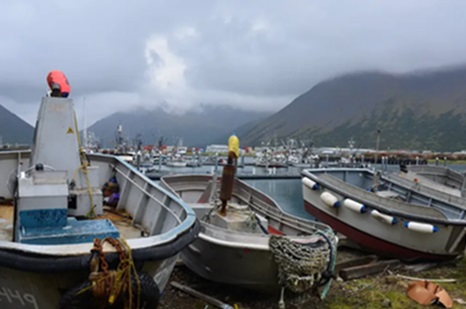
Alaska fishermen and processing plants are in limbo as a state-backed seafood company teeters
The fishing fleet in the Southwest Alaska town of King Cove would have been harvesting Pacific cod this winter. But they couldn’t: Skippers had nowhere to sell their catch. The enormous plant that usually buys and processes their fish never opened for the winter season. The company that runs the plant, Peter Pan Seafoods, is facing six-figure legal claims from fishermen who say they haven’t been paid for catches they delivered months ago. King Cove’s city administrator says the company is behind on its utility payments. And now, residents fear the plant may stay closed through the summer salmon season, which would leave the village with just half of the revenue that normally funds its yearly budget. “We should be fishing right now,” said Ken Mack, a longtime King Cove fisherman. more, >>click to read<< 09:36
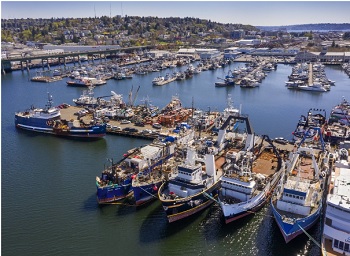
As Alaska fishing season set to begin, fearful communities and seafood industry try to prevent spread of coronavirus
Trident and other seafood-company officials hope to ensure that factory trawlers making their way through remote swaths of the Bering Sea do not replay any of the harrowing scenarios that unfolded on cruise ships this year, when waves of the virus sickened passengers. “The chance of having one hiccup — it’s going to ruin the season for everyone,” Hall said. “The boat has to be virus free.” Processors face another daunting challenge in launching salmon operations in remote Alaska communities, many of which suffered losses in the flu pandemic of more than a century ago and are fearful of thousands of seasonal workers spreading COVID-19. photos, >click to read< 11:43
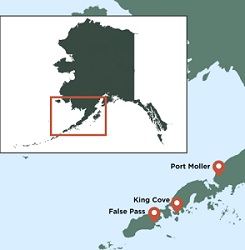
A new fish processor is buoying King Cove’s fishermen. But,,
King Cove has long been a company town. For decades, its fishermen were frustrated by Peter Pan Seafoods, Inc., the private company that runs King Cove’s own massive processing plant. Especially vexing were the limits: While another processor in the region was buying far more salmon, Peter Pan would only buy 35,000 pounds from each boat, each day, said A.J. Newman, a King Cove city council member who skippers the 58-foot Lady Lee Dawn.“It’s hard to watch your friends catch double what you caught,” said Newman. “Peter Pan had too many boats,,, >click to read< 08:44
Alaska Seafood Industry Asks For Retaliatory Ban on Russian Imports
 It’s been two weeks since Russia banned imports of American food products into its country. Now, Alaska’s seafood industry is asking the U.S. government to strike back. Read more here 20:07
It’s been two weeks since Russia banned imports of American food products into its country. Now, Alaska’s seafood industry is asking the U.S. government to strike back. Read more here 20:07

































